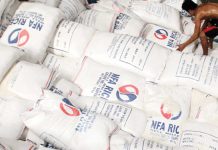SYDNEY – Asian share markets consolidated weekly gains last week as Sino-US talks dragged on with no concrete conclusions, while caution ahead of US payrolls and a holiday in China and Hong Kong dampened volatility.
MSCI’s broadest index of Asia-Pacific shares outside Japan was little changed and near its highest since the end of August. It was still up 1.9 percent for the week and 13 percent for the year so far.
Japan’s Nikkei added 0.1 percent, to be 2.6 percent firmer for the week. E-Mini futures for the S&P 500 edged up 0.04 percent.
“Share markets have run hard and fast from their December lows and are vulnerable to a short-term pullback,” said Shane Oliver, head of investment strategy at AMP Capital.
“But valuations are okay, global growth is expected to improve into the second half of the year, monetary and fiscal policy has become more supportive of markets and the trade war threat is receding.”
Xinhua reported Chinese President Xi Jinping had said progress was being made and called for an early conclusion of negotiations.
US President Donald Trump said on Thursday a deal could be announced in about four weeks, but warned it would be difficult to let China trade with the United States if remaining issues were not resolved.
Investors are also waiting on the US payrolls report which is forecast to bounce back by 180,000 in March, following February’s distorted 20,000 rise. One focus will be hourly earnings which climbed to 3.4 percent in February, the fastest pace since April 2009.
Hopes for a solid number were boosted by data on jobless claims which fell to a 49-year low last week, pointing to sustained labor market strength.
The Dow ended Thursday up 0.64 percent, while the S&P 500 gained 0.21 percent and the Nasdaq dropped 0.05 percent. The S&P 500 reached its highest level since Oct. 9 and is only 1.75 percent below its all-time closing high.
YEN EASING
In currencies, the progress on trade was enough to keep the safe-haven yen under pressure and lift the dollar to its highest in three weeks at 111.79. The next chart stops were 111.89 and the March peak around 112.12.
Against a basket of currencies the dollar had bounced back to 97.312, from Wednesday’s low of 96.962.
Reuters reported Saudi Arabia is threatening to sell its oil in currencies other than the dollar if Washington passes a bill exposing OPEC members to U.S. antitrust lawsuits, three sources familiar with Saudi energy policy said.
The euro was flat at $1.1227 having dipped overnight in the wake of poor German data. Industrial orders there fell by the most in more than two years in February as foreign demand slumped, another sign that Europe’s largest economy had a weak start to the year.
Sterling was stalled at $1.3077 as markets awaited some clarity on where Brexit was heading.
Pro-Brexit lawmakers in Britain’s upper house of parliament tried on Thursday to thwart the approval of a new law that would force Prime Minister Theresa May to seek a delay to prevent a disorderly EU exit on April 12 without a deal.
A source close to negotiations on the timetable for the bill said they expected it to be finalized on Monday.
In commodity markets, spot gold steadied at $1,291.61 per ounce after touching a near 10-week low overnight.
Brent oil had briefly touched $70 a barrel for the first time since November on Thursday as expectations of tight global supply outweighed pressure from rising US production.
Brent crude futures were off 15 cents at $69.25, while US crude rose 3 cents to $62.13 a barrel. (Reuters)







